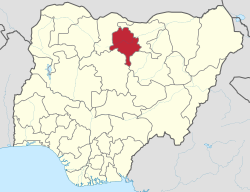Kano State
| Kano State | ||
|---|---|---|
| State | ||
|
||
| Nickname(s): Centre of Commerce | ||
 Location of Kano State in Nigeria |
||
| Coordinates: 11°30′N 8°30′E / 11.500°N 8.500°ECoordinates: 11°30′N 8°30′E / 11.500°N 8.500°E | ||
| Country |
|
|
| Date created | May 27, 1967 | |
| Capital | Kano | |
| Government | ||
| • Governor | Dr Abdullahi Umar Ganduje | |
| • Senators | ||
| • Representatives | List | |
| Area | ||
| • Total | 20,131 km2 (7,773 sq mi) | |
| Area rank | 20th of 36 | |
| Population (2006 census) | ||
| • Total | 9,383,682 | |
| • Estimate (2011) | 11,058,300 | |
| • Rank | 1st of 36 | |
| • Density | 470/km2 (1,200/sq mi) | |
| GDP (PPP) | ||
| • Year | 2007 | |
| • Total | $12.39 billion | |
| • Per capita | $1,288 | |
| Time zone | WAT (UTC+01) | |
| ISO 3166 code | NG-KN | |
| Website | kano.gov.ng | |
| ^1 Preliminary results | ||
Kano State is a state located in North-Western Nigeria. Created on May 27, 1967 from part of the Northern Region, Kano state borders Katsina State to the north-west, Jigawa State to the north-east, Bauchi State to the south-east and Kaduna State to the south-west. The capital of Kano State is Kano.
The state originally included Jigawa State which was made a separate state in 1991.
Subsistence and commercial agriculture is mostly practiced in the outlying districts of the state. Some of the food crops cultivated are millet, cowpeas, sorghum, maize and rice for local consumption while groundnuts and cotton are produced for export and industrial purposes. During the colonial period and several years after the country’s independence, the groundnuts produced in the state constituted one of the major sources revenue of the country. Kano State is a major producer of hides and skins, sesame, soybean, cotton, garlic, gum arabic and chili pepper.
Commercial activities in Kano first developed with the establishment of the Kurmi market by the Emir of Kano Muhammadu Rumfa in the 16th Century CE. Subsequent leaders made contributions to the emergence of Kano as a leading commercial center in Sudanic Africa. During the Caliphate period in the 19th century the Emirs Ibrahim Dado and Sulaimanu encouraged traders to move from Katsina, capitalising on raids from the Hausa Sultanate of Maradi. The Jihad leaders of the Caliphate encouraged Kola nut trade and Kano was the greatest beneficiary with an annual turnover of about $30 million. Craft industries also evolved in the pre-colonial period contributing to the prosperity of the province.
...
Wikipedia

